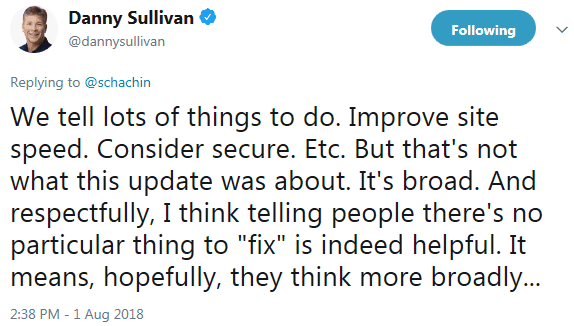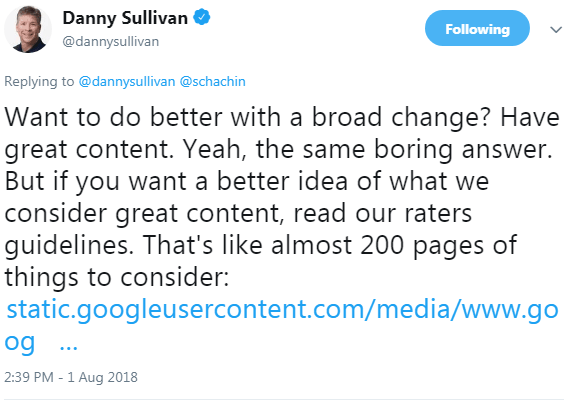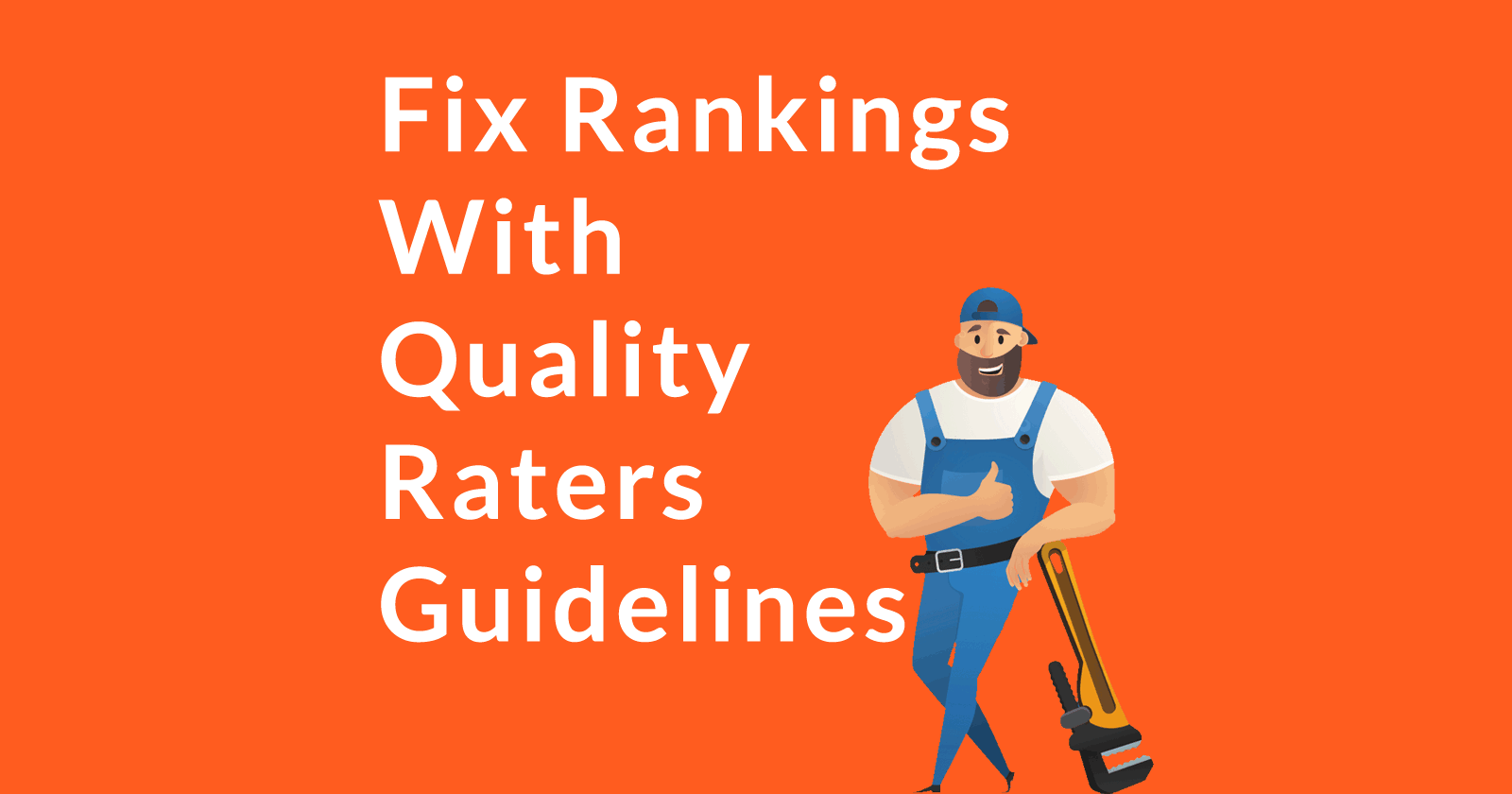The quality raters guidelines provides insights into what improvements can be made to a web page to help it rank better. It is not a step by step guide. However Google’s Danny Sullivan encouraged publishers to read it for ideas on how to build a better experience for users and ultimately to improve rankings.
Google’s Danny Sullivan remarked that sites that dropped positions in the August Broad Core Update cannot fix themselves out of lost rankings.
 Google’s Danny Sullivan issued follow up statements to clarify that there is nothing to fix for sites that lost rankings.
Google’s Danny Sullivan issued follow up statements to clarify that there is nothing to fix for sites that lost rankings.Yet he also encouraged site publishers to read the Google Quality Raters Guidelines to better understand how to rank better in Google’s algorithm. The first statement discourages hope. The second statement lights a way to better rankings, seemingly contradicting the first statement.
 Google’s Danny Sullivan encouraged downloading and reading Google’s Quality Raters Guidelines in order to better understand how to rank better.
Google’s Danny Sullivan encouraged downloading and reading Google’s Quality Raters Guidelines in order to better understand how to rank better.Why Did Google Say Nothing to Fix?
After every update (and so-called Phantom update), the SEO industry focuses on finding “quality” issues to fix. These quality issues are consistenly thin content, excessive advertising, site speed and poor inbound links. The usual suspects, so to speak.
It is naive to assume that every single update is focused on removing sites from the search results for “quality” issues.
Search engineers are focused on satisfying users. Better results are not exclusively about removing sites with “quality” issues.
Better results come from becoming adept at identifying what users desire when they search. That’s what RankBrain is about.
When RankBrain was introduced it was focused on understanding what users meant when they searched with the 15% of search queries Google has never seen.
At some point Google updated it’s algorithm to expand the use of RankBrain to more queries.
When the update that expanded RankBrain to more queries happened, some in the search community may have noticed and responded by jumping on the “quality” update train. And that was a train that led in the opposite direction of where the algorithm was headed.
So when Google’s Danny Sullivan said there was nothing to fix, he may very well have been communicating that the broad core update was not about penalizing sites for “quality” issues, therefore there’s nothing to fix.
If the algorithm update is not about penalizing sites for “quality” issues then the update may likely be about presenting more relevant search results.
And when we talk about “relevance” the measure of relevance is user satisfaction. And that’s where Google’s quality raters come in.
What the Quality Raters are About
Machine learning algorithms need a baseline to learn from. Human judgment serves as the baseline from which a machine can learn from and test itself from.
For example, here’s a research paper describing a way to reformulate search queries, Generalized Syntactic and Semantic Models of Query Reformulation. What’s interesting is how the researchers use human quality raters to judge which results are most relevant and then use those judgments to score the algorithm against.
“The evaluation involves a query reformulation task in which several source queries are provided, each with a set of candidate reformulations scored by raters… This shows that the co-click hypothesis yields positively related pairs that are judged on average as Very Related by human raters, while the control set are judged only as Slightly Related.”
Google hires quality raters to evaluate search results in order to provide feedback on the algorithm. The quality raters guidelines is meant to teach the human raters how to classify web pages as useful and so on.
Here is how the quality raters guidelines defines the job of a quality rater:
“Your ratings will be used to evaluate search engine quality around the world.”
Why Google Recommended the Quality Raters Guidelines
The quality raters guidelines tells us what kinds of web pages Google wants to rank. It provides clues as to the kind of content Google wants a website to have.
The raters guidelines identifies the five most important factors for rating a high quality web page. Note: MC is an abbreviation for Main Content.
Five most important rating factors:
- The Purpose of the Page
- Expertise, Authoritativeness, Trustworthiness: This is an important quality characteristic.
- Main Content Quality and Amount: The rating should be based on the landing page of the task URL.
- Website Information/information about who is responsible for the MC: Find information about the website as well as the creator of the MC.
- Website Reputation/reputation about who is responsible for the MC
How to Fix Lost Rankings in the August Broad Core Update
Danny Sullivan’s first statement that there’s nothing to fix seemingly contradicts his follow up statement to read Google’s quality raters guidelines for information on Google’s expectations for quality content. The only way to reconcile these statements is to accept that the first statement addresses SEOs and publishers who will try to identify what they did wrong.
In this kind of update, there is no “wrong” to fix because the update was not about catching pages that did something wrong.
Google’s second statement recommending the raters guidelines may indicate that this update was about being able to surface sites in the search results that did something right.
In my opinion, I believe that if a site lost rankings, then it may be because another site did something right better than your own site. The answer to why another site is better than yours can be found in the quality raters guidelines.
Takeaway: Things to Fix
As noted above, there are five important factors related to ranking better. It’s possible to divide those factors into two categories: Author factors and content factors.
Two of the five factors relate to the author of the content, three if you include Expertise, Authoritativeness and Trustworthiness.
Three of those factors are about the content itself.
Three most important content factors:
- The purpose of the page
- Expertise, authoritativeness, and trustworthiness
- Quality and amount of main content (as opposed to advertising content)
How to Improve Ranking Signals
If you read the quality raters guidelines you’ll see that certain kinds of sites require stricter criteria to rank. For example anything related to finances is going to be held to a sctricter standard.
I suspect that every niche and keyword phrase is going to require different ranking factors. Evidence of that is in the fact that Google created a Your Money or Your Life category of sites that deal with specific topics.
So if your site is not one of these kinds of pages, then the criteria for ranking is going to be different. Thus, you don’t necessarily have to work at getting every ranking signal correct. Only focus on the signals that are appropriate for you.
Here is how Google defines these sensitive pages
“Some types of pages could potentially impact the future happiness, health, financial stability, or safety of users. We call
such pages “Your Money or Your Life” pages, or YMYL.”
It then lists the six categories of pages that fall into this category that needs extra work for ranking:
- Shopping or financial transaction pages
- Financial information pages
- Medical information pages
- Legal information pages
- News articles or public/official information pages
- Other
The other category is one that you’ll have to determine if you fall into this category. And remember, Google’s not evaluating entire sites, they are evaluating pages. Section 2.3 of the Quality Raters Guideline is called, “Your Money or Your Life (YMYL) Pages.”
From my observations, some of these extra requirements are not required for ranking for certain keyword phrases that lie outside of the safety/health/money etc. categories.
If you compare keywords within a single niche, you’ll see (as I did) that some keyword phrases are more sensitive than others. Phrases are being treated differently according to how sensitive the topic is to a person’s life, health and money.
Should You Go for the Gold Standard?
It probably won’t hurt to give your shot at rankings a 150% push. It might not make a difference, now. But it could make a different later on. So being prepared to meet the algo of tomorrow could make sense.
Compare Your Page to Better Ranking Pages
When losing rankings, always compare your site to those that replaced yours. There may be clues there as to why Google declined to rank your sites.
Typical questions to answer:
- What do those pages/sites have that yours do not?
- How do those pages approach the content that differs from yours?
- Are those pages more specific?
- Are those pages addressing a different audience?
Review Your Page as a User
The answers to those questions relate directly to how the quality raters guide defines satisfying users. The introduction of the Quality Raters Guide makes it clear that the raters are standing in for users. Section 0.2 is titled, “Raters Must Represent the User.”
So when you study the search results looking for answers, you too must look at it as a user.
Here is what the raters guide specifies:
“It is very important for you to represent users in the locale you evaluate. You must be very familiar with the task language
and location in order to represent the experience of users in your locale.”
That is how you should review the search results, as a user in a specific location with specific experience. If you’re selling maternity clothes, I suspect the information needs of a new mother will differ from an experienced mother. Maybe most shoppers on that site are new? This is the kind of information that will help you better satisfy users.
It’s the users that influence the search results. As the raters guidelines indicates, get into the mindset of the user.
Don’t Follow the Money
In politics and crime they say, “Follow the money.” But for search marketing it’s “Follow the user.”
This is a profound and pragmatic insight that is found within the raters guidelines. Count how many times the word User occurs in the raters guidelines. I lost count after forty.
Download Google’s Quality Raters Guidelines here.
More Resources
Images by Shutterstock, Modified by Author
Screenshots by Author




